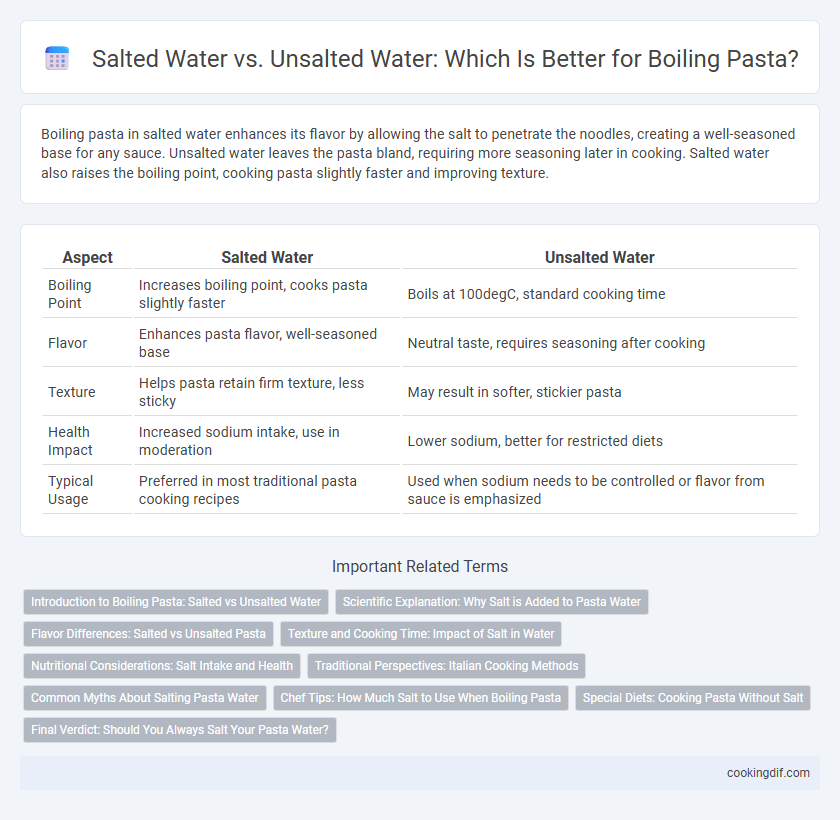Boiling pasta in salted water enhances its flavor by allowing the salt to penetrate the noodles, creating a well-seasoned base for any sauce. Unsalted water leaves the pasta bland, requiring more seasoning later in cooking. Salted water also raises the boiling point, cooking pasta slightly faster and improving texture.
Table of Comparison
| Aspect | Salted Water | Unsalted Water |
|---|---|---|
| Boiling Point | Increases boiling point, cooks pasta slightly faster | Boils at 100degC, standard cooking time |
| Flavor | Enhances pasta flavor, well-seasoned base | Neutral taste, requires seasoning after cooking |
| Texture | Helps pasta retain firm texture, less sticky | May result in softer, stickier pasta |
| Health Impact | Increased sodium intake, use in moderation | Lower sodium, better for restricted diets |
| Typical Usage | Preferred in most traditional pasta cooking recipes | Used when sodium needs to be controlled or flavor from sauce is emphasized |
Introduction to Boiling Pasta: Salted vs Unsalted Water
Boiling pasta in salted water enhances the pasta's flavor by allowing the salt to penetrate the surface during cooking, resulting in a more seasoned dish. Using unsalted water can lead to blander pasta that requires additional seasoning after cooking. The optimal salt concentration for boiling pasta is roughly 1-2% by weight, balancing taste and cooking efficiency.
Scientific Explanation: Why Salt is Added to Pasta Water
Salt increases the boiling point of water through a process called boiling point elevation, which helps pasta cook more evenly and prevents a mushy texture. Adding salt to pasta water also enhances the flavor by penetrating the pasta's surface during cooking, allowing the seasoning to be absorbed uniformly. Scientific studies show salted water minimally affects cooking time but significantly improves taste and texture, making it a crucial step in pasta preparation.
Flavor Differences: Salted vs Unsalted Pasta
Boiling pasta in salted water enhances the noodle's natural flavor by allowing salt to penetrate the pasta, resulting in a more balanced and savory taste. Unsalted water makes the pasta bland, requiring more seasoning in the sauce to compensate for the lack of intrinsic flavor. Proper salting of boiling water is essential to achieve optimal taste and elevate the overall pasta dish.
Texture and Cooking Time: Impact of Salt in Water
Salted water raises the boiling point, allowing pasta to cook slightly faster and evenly, resulting in a firmer, more al dente texture. Unsalted water boils at a lower temperature, potentially leading to softer pasta with a longer cooking time. The presence of salt enhances the surface tension of the water, improving starch gelatinization and texture development during cooking.
Nutritional Considerations: Salt Intake and Health
Boiling pasta in salted water increases the sodium content of the final dish, which can contribute to higher salt intake and impact blood pressure regulation, especially in individuals with hypertension. Unsalted water preserves the natural nutritional profile of pasta without adding extra sodium, supporting a heart-healthy diet and reducing the risk of cardiovascular diseases. Monitoring salt usage during cooking is essential for maintaining balanced sodium levels and promoting overall health.
Traditional Perspectives: Italian Cooking Methods
Traditional Italian cooking methods emphasize using salted water for boiling pasta to enhance flavor and improve texture by seasoning the pasta from within. Salted water raises the boiling point slightly, ensuring proper cooking and preventing bland pasta, which is a cornerstone of authentic Italian culinary practice. Unsalted water is generally avoided in Italy, as it results in under-seasoned pasta that requires heavy sauce compensation, detracting from the delicate balance of flavors.
Common Myths About Salting Pasta Water
Contrary to common myths, salting pasta water is essential for enhancing the pasta's flavor rather than just seasoning the cooking water. Adding salt to boiling water increases the water's boiling point marginally but does not significantly reduce cooking time or prevent pasta from sticking. The key benefit of salted water lies in allowing the pasta to absorb a subtle salty taste, which cannot be effectively added after cooking.
Chef Tips: How Much Salt to Use When Boiling Pasta
For perfectly seasoned pasta, use about 1 to 1.5 tablespoons of kosher salt per 4 quarts of boiling water to enhance flavor without overpowering. Salted water increases the boiling point, helping pasta cook evenly while infusing it with subtle seasoning from the inside out. Avoid unsalted water, as it leads to bland pasta that requires more sauce to compensate for the lack of flavor.
Special Diets: Cooking Pasta Without Salt
Boiling pasta in unsalted water is essential for special diets requiring sodium restriction, such as hypertension or kidney disease management. Although salted water enhances flavor and helps pasta cook evenly, omitting salt reduces overall sodium intake while still allowing the pasta to cook properly. To compensate, seasoning the pasta with herbs, garlic, or salt-free sauces after cooking can maintain taste without compromising dietary needs.
Final Verdict: Should You Always Salt Your Pasta Water?
Salting pasta water enhances the pasta's flavor by allowing it to absorb the seasoning during cooking, making it a crucial step for a well-balanced dish. Unsalted water results in bland pasta that requires more sauce or additional seasoning to compensate. For optimal taste and texture, always salt your pasta water to achieve a flavorful foundation.
Salted water vs unsalted water for boiling Infographic

 cookingdif.com
cookingdif.com